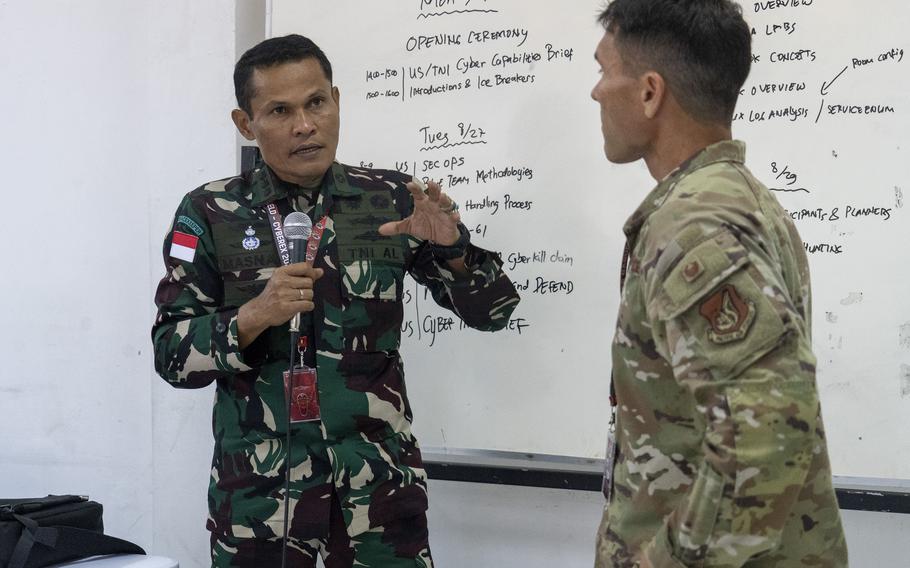
Indonesian armed forces Col. Masnal Samian, coordinator of the cyber exercise for Super Garuda Shield, discusses cyber security concepts with Air Force Col. Glen Hayase, commander of the 154th Mission Support Group, in Surabaya, Indonesia, Aug. 26, 2024. (Orlando Corpuz/U.S. Air National Guard)
Technology experts from four nations spent the past two weeks practicing a defense against nefarious hacking during the first-ever cyber exercise held as part of Super Garuda Shield in Indonesia.
The cyber exercise is the latest expansion of what began as Garuda Shield in 2006, when it was merely an information and training exchange between U.S. and Indonesia armed forces.
In 2022, the exercise expanded in scope and participation. This year the exercise ran from Aug. 26 through Friday.
The cyber exercise was added at the request of Indonesia’s armed forces chief, said Maj. Gen. Joseph Harris, commander of the Hawaii Air National Guard, during a phone interview Thursday from Indonesia.
Gen. Agus Subiyanto has commanded the Tentara Nasional Indonesia, or TNI, since 2023 and reports directly to the Indonesian president.
“He called for it, and we — and the other nations participating — happily put together the team and the scenario to practice preparing for cyber threats,” Harris said.
Cyber security is a growing priority for Indonesia, which borders the contested South China Sea and is the world’s most populous Muslim-majority country.
The Jakarta Post reported Wednesday that Indonesian President Joko Widodo has ordered the establishment of the Indonesian Cyber Force, which would become the fourth service branch of the TNI.
Personnel from the Hawaii National Guard built and managed the “self-contained cyber-range environment” used during the exercise, Harris said. They also helped provide the training scenarios and the “network backbone” to conduct the training, he said.
The appeal of such an exercise is no mystery, Harris said.
“I think every nation realizes how vulnerable they are to cyber threats,” he said. “I think every country likely feels that they’re behind the curve, or behind the power curve, on establishing the right defensive posture and having the right defensive capabilities to protect their key infrastructure, their economies, all their military operations, for example.”
Most multinational exercises of any size conduct some element of cyber defense, but the Garuda cyber exercise has a dedicated training scenario that is separate from the staff exercise.
“It’s tailored for a complex cyber-threat environment,” Harris said.
At a training compound devoted to only cyber training, 27 experts from the U.S., Indonesia, United Kingdom and Singapore broke into blue and red teams, he said.
“They created four multinational teams, each with about seven folks, and each one led by one of the participating countries,” he said.
Each team then divided into a blue force that defended the network, while the red force sought to infiltrate it.
“So, collectively, one attacks, one tries to defend, and then they compare notes, and they do it again,” Harris said.
Harris declined to provide details on what lessons were learned from the red-on-blue challenges, but he described the depth of knowledge and expertise in personnel from Indonesia, Singapore and the U.K. as “remarkable.”
“We didn’t really realize we had such resources,” he said.
Exercise planners made a deliberate choice to gather all the cyber experts in one location rather than connect virtually.
“It’s important to have the one-on-one interaction with our partners,” U.S. Air Force Col. Glen Hayase, a cyber facilitator for the exercise, said in a video posted Tuesday by the Hawaii Air National Guard.
“So much of the relationship-building happens outside the cyber scenario — during coffee break, during lunch, before and after,” he said. “It’s good to know we have those friends that we could call upon if we really need to.”
Harris predicted the cyber exercise would grow in Super Garuda Shields to come.
“In fact, I would say it’ll become a focal area in future years because of the amount of interest that’s been generated just from doing it this year,” he said. “It’ll be a hallmark of the event in the future.”